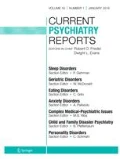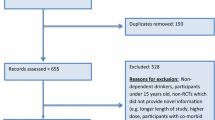Abstract
Alcoholism is a devastating illness that leads to great societal losses. Despite significant health consequences, there are few medically based treatments for alcoholism. During the past decade, a better understanding of the neuroscientific underpinnings of addiction has led to the use of novel pharmacotherapeutic treatments for alcoholism. In particular, there have been new developments in the understanding of the involvement of the dopamine, opiate, serotonin, gammaaminobutyric acid, and glutamate neurotransmitter systems in the pathophysiology of alcohol withdrawal, alcohol dependence, and in subtypes of individuals with alcoholism. In this article, new developments in the pharmacotherapy of alcohol dependence will be reviewed. In particular, the use of anticonvulsants in alcohol withdrawal and protracted abstinence syndromes will be discussed. Data on naltrexone, acamprosate, and topiramate will be highlighted. In addition, data concerning the use of serotonin reuptake inhibitors in subtypes of alcoholism and the use of combination pharmacotherapy will be reviewed.
Similar content being viewed by others
References and Recommended Reading
Reiger DA, Farmer ME, Rae DS, et al.: Comorbidity of mental disorders with alcohol and other drug abuse. JAMA 1990, 264:2511–2518.
.Smothers BA, Yahr HT, Ruhl CE: Detection of alcohol use disorders in general hospital admissions in the United States. Arch Intern Med 2004, 164:749–756. This recent study suggests that the detection, inpatient intervention, and referral of individuals with alcohol use disorders are low. Recommendations are made to increase professional evaluation and treatment of patients.
Ewing JA: Detecting alcoholism: The CAGE questionnaire. JAMA 1984, 252:1905–1907.
Saunders JB, Aasland OG, Babor TF, et al.: Development of the Alcohol Use Disorders Screening Test (AUDIT). WHO collaborative project on early detection of persons with harmful alcohol consumption. Addiction 1993, 88:791–804.
Mihas AA, Tavassoli M: Laboratory markers of ethanol intake and abuse: a critical appraisal. Am J Med Sci 1992, 303:415–428.
Anton RF, Stout RL, Roberts JS, et al.: The effects of drinking intensity and frequency on serum carbohydrate-deficient transferrin and gamma-glutamyltransferase levels in outpatient alcoholics. Alcohol Clin Exp Res 1998, 22:1456–1462.
Litten RZ, Allen JP, Fertig JB: Gamma-glutamyltransferase and carbohydrate deficient transferrin: Alternative measures of excessive alcohol consumption. Alcohol Clin Exp Res 1995, 19:1541–1546.
Anton RF: Carbohydrate-deficient transferrin for detection and monitoring of sustained heavy drinking. What have we learned? Where do we go from here? Alcohol 2001, 25:185–188. This article is a thorough review of the use of CDT in detecting and monitoring heavy drinking. Issues such as comparing the sensitivity and specificity of CDT with GGT, gender issues in using CDT, and the use of CDT as a monitoring tool are addressed.
Allen JP, Sillamaukee P, Anton R: Contribution of carbohydratedeficient transferrin to gamma-glutamyltranspeptidase in evaluating progress of patients in treatment of alcoholism. Alcohol Clin Exp Res 1999, 23:115–120.
Institute of Medicine: Prevention and Treatment of Alcohol Problems. Washington, DC: National Academy Press; 1990, 268–269.
Mayo-Smith MF: Pharmacological management of alcohol withdrawal. A meta-analysis and evidence-based practice guideline. JAMA 1997, 278:144–151.
Saitz R, Mayo-Smith MF, Roberts MS, et al.: Individualized treatment for alcohol withdrawal: A randomized doubleblind controlled trial. JAMA 1994, 272:519–523.
Malcolm R, Myrick H, Brady KT: Update on anticonvulsants for the treatment of alcohol withdrawal. Am J Addictions 2001, 10(suppl):16–23.
Brown ME, Anton RF, Malcolm R, et al.: Alcohol detoxification and withdrawal seizures: clinical support for a kindling hypothesis. Biol Psychiatry 1988, 23:507–514.
Moak DH, Anton RF: Alcohol-related seizures and the kindling effect of repeated detoxifications: the influence of cocaine. Alcohol Alcohol 1996, 31:135–143.
Becker HC: Alcohol withdrawal: Neuroadaption and sensitization. CNS Spectrums 1999, 4:38–65.
Bastie Y: Suppression by depakene of epileptic crises caused by withdrawal in alcoholic detoxification. Ann Med Psychol (Paris) 1970, 128:200–204.
Bonfiglio C, Falli S, Pacini A: The use of sodium dipropylacetate to prevent and treat alcoholic delerium tremens. Minerva Med 1977, 63:4233–4255.
Lambie DG, Johnson RH, Vijayasenan ME, et al.: Sodium valproate in the treatment of the alcohol withdrawal syndrome. Aust N Z J Psychiatry 1980, 14:213–215.
Myrick H, Brady KT, Malcolm R: Divalproex in the treatment of alcohol withdrawal. Am J Drug Alcohol Abuse 2000, 26:155–160.
Rosenthal RN, Perkel C, Singh P, et al.: A pilot open randomized trial of valproate and phenobarbital in the treatment of acute alcohol withdrawal. Am J Addict 1998, 7:189–197.
Hillbom ME, Hjelm-Jager M: Should alcohol withdrawal seizures be treated with anti-epileptic drugs? Acta Neurol Scand 1984, 69:39–42.
Reoux JP, Saxon AJ, Malte CA, et al.: Divalproex sodium in alcohol withdrawal: a randomized double-blind placebo-controlled clinical trial. Alcohol Clin Exp Res 2001, 25:1324–1329.
Bjorkqvist SE, Isohanni M, Makela R, et al.: Ambulant treatment of alcohol withdrawal symptoms with carbamazepine: a formal multicentre double-blind comparison with placebo. Acta Psychiatr Scand 1976, 53:333–342.
Sonck T, Malinen L, Hanne J: Carbamazepine in the treatment of acute withdrawal syndrome in alcoholics: methodological aspects. In Rationality of Drug Development. Excerpta Medica International Congress Series No. 383. Edited by Lucchelli PE, Bergamini N, Bachini V. Amsterdam: Excerpta Medica; 1976:251.
Malcolm R, Ballenger JC, Sturgis ET, et al.: Double-blind controlled trial comparing carbamazepine to oxazepam treatment of alcohol withdrawal. Am J Psychiatry 1989, 146:617–621.
Stuppaeck CH, Pycha R, Miller C, et al.: Carbamazepine versus oxazepam in the treatment of alcohol withdrawal: a double blind study. Alcohol Alcohol 1991, 27:153–158.
Malcolm R, Myrick H, Roberts J, et al.: The differential effects of medication on psychiatric and psychosocial outcomes in outpatient alcohol detoxification. Am J Addictions 2002, 11:141–150.
Watson WP, Robinson E, Little HJ: The novel anticonvulsant, gabapentin, protects against both convulsant and anxiogenic aspects of the ethanol withdrawal syndrome. Neuropharmacology 1997, 36:1369–1375.
Bailey CP, Molleman A, Little HJ: Comparison of the effects of drugs on hyperexcitability induced in hippocampal slices by withdrawal from chronic ethanol consumption. Br J Pharmacol 1998, 123:215–222.
Myrick H, Malcolm R, Brady KT: Gabapentin treatment of alcohol withdrawal. Am J Psychiatry 1998, 155:1632.
Bonnet U, Banger M, Leweke FM, et al.: Treatment of alcohol withdrawal syndrome with gabapentin. Pharmacopsychiatry 1999, 32:107–109.
Fuller RK, Branchey L, Brightwell DR, et al.: Disulfiram treatment of alcoholism: a Veterans Administration cooperative study. JAMA 1986, 256:1449–1455.
Chick J, Gough K, Falkowski W, et al.: Disulfiram treatment of alcoholism. Br J Psychiatry 1992, 161:84–89.
Anton RF, Swift RM: Current pharmacotherapies of alcoholism: a U.S. Perspective. Am J Addict, 2003 12(Suppl1):S53–68. This article is a comprehensive review of the pharmacotherapies used in the treatment of alcoholism. Particular emphasis is placed on naltrexone, acamprosate, and serotonergic agents.
Kranzler HR, Van Kirk J: Efficacy of naltrexone and acamprosate for alcoholism treatment: a meta-analysis. Alcohol Clin Exp Res 2001, 25:1335–1341.
Streeton C, Whelan G: Naltrexone, a relapse prevention maintenance treatment of alcohol dependence: a meta-analysis of randomized controlled trials. Alcohol Alcohol 2001, 36:544–552.
Balldin J, Berglund M, Borg S, et al.: A 6-month controlled naltrexone study: combined effect with cognitive behavioral therapy in outpatient treatment of alcohol dependence. Alcohol Clin Exp Res 2003, 27:1142–1149.
Kranzler HR, Modesto-Lowe V, Nuwayser ES: Sustained-release naltrexone for alcoholism treatment: a preliminary study. Alcohol Clin Exp Res 1998, 22:1074–1079.
Chick J, Anton R, Checinski K, Croop R, et al.: A multicentre, randomized, double-blind, placebo-controlled trial of naltrexone in the treatment of alcohol dependence or abuse. Alcohol Alcohol 2000, 35:587–593.
Kranzler HR, Modesto-Lowe V, Van Kirk J: Naltrexone vs. nefazodone for treatment of alcohol dependence. A placebo-controlled trial. Neuropsychopharmacology 2000, 22:493–503.
Krystal JH, Cramer JA, Krol WF, et al.: Naltrexone in the treatment of alcohol dependence. N Engl J Med 2001, 345:1734–1739.
Oslin DW, Berrettini W, Kranzler HR, et al.: A functional polymorphism of the mu-opioid receptor gene is associated with naltrexone response in alcohol-dependent patients. Neuropsychopharmacology 2003, 28:1546–1552. This study evaluated the association between two specific polymorphisms of the gene encoding the mu opioid receptor and treatment outcomes in alcoholics treated with naltrexone or placebo. Lower relapse rates were found in individuals with one or two copies of the ASP40 allele who were treated with naltrexone suggesting that genes encoding the opioid receptor might predict treatment response.
Littleton J: Acamprosate in alcohol dependence: How does it work? Addiction 1995, 90:1179–1188.
Chick J, Lehert P, Landron F: Does acamprosate improve reduction of drinking as well as aiding abstinence? J Psychopharmacol 2003, 17:397–402.
Mason B, Ownby R: Acamprosate for the treatment of alcohol dependence: A review of double-blind, placebo-controlled trials. CNS Spectrum 2000, 5:58–69.
Naranjo CA, Sellers EM, Sullivan JT, et al.: The serotonin uptake inhibitor citalopram attenuates ethanol intake. Clin Pharmacol Ther 1987, 41:266–274.
Janiri L, Gobbi G, Mannelli P, et al.: Effects of fluoxetine and antidepressant doses on sort-term outcome of detoxified alcoholics. Int Clin Psychopharmacol 1996, 11:109–117.
Angelone SM, Bellini L, Di Bella D, et al.: Effects of fluvoxamine and citalopram in maintaining abstinence in a sample of Italian detoxified alcoholics. Alcohol Alcohol 1998, 33:151–156.
Kranzler HR, Burleson JA, Korner P, et al.: Placebo-controlled trial of fluoxetine as an adjunct to relapse prevention in alcoholics. Am J Psychiatry 1995, 152:391–397.
Kabel D, Petty F: A double-blind study of fluoxetine in severe alcohol dependence: adjunctive therapy during and after inpatient treatment. Alcohol Clin Exp Res 1996, 20:780–784.
Babor TF, Hofmann M, DelBoca FK, et al.: Types of alcoholics, I. Evidence for an empirically derived typology based on indicators of vulnerability and severity. Arch Gen Psychiatry 1992, 49:599–608.
Cloninger CR, Bohman M, Sigvardsson S: Inheritance of alcohol abuse. Cross-fostering analysis of adopted men. Arch Gen Psychiatry 1981, 38:861–868.
Tiihonen J, Ryynanen OP, Kauhanen J, et al.: Citalopram in the treatment of alcoholism: a double-blind placebo-controlled study. Pharmacopsychiatry 1996, 29:27–29.
Kranzler HR, Burleson JA, Brown J, et al.: Fluoxetine treatment seems to reduce the beneficial effects of cognitive-behavioral therapy in type B alcoholics. Alcohol Clin Exp Res 1996, 20:1534–1541.
Pettinati HM, Volpicelli JR, Kranzler HR, et al.: Sertraline treatment for alcohol dependence: Interactive effects of medication and alcoholic subtype. Alcohol Clin Exp Res 2000, 24:1041–1049.
Sellers EM, Toneatto T, Romach MK, et al.: Clinical efficacy of the 5-HT3 antagonist ondansetron in alcohol abuse and dependence. Alcohol Clin Exp Res 1994, 18:879–885.
Mueller TI, Stout RL, Rudden S, et al.: A double-blind, placebocontrolled pilot study of carbamazepine for the treatment of alcohol dependence. Alcohol Clin Exp Res 1997, 21:86–92.
Brady KT, Myrick H, Henderson S, et al.: The use of divalproex in alcohol relapse prevention: a pilot study. Drug Alcohol Depend 2002, 67:323–330.
Longo LP, Campbell T, Hubatch S: Divalproex sodium (Depakote) for alcohol withdrawal and relapse prevention. J Addict Dis 2002, 21:55–64.
Johnson BA, Ait-Daoud N, Bowden CL, et al.: Oral topiramate for treatment of alcohol dependence: a randomised controlled trial. Lancet 2003, 361:1677–1685. This study is a randomized, placebo-controlled trial of the anticonvulsant topiramate in the treatment of alcoholism. Results indicate that patients treated with topiramate had multiple treatmentrelated improvements than compared with patients treated with placebo.
Kiefer F, Jahn H, Tarnaske T, et al.: Comparing and combining naltrexone and acamprosate in relapse prevention of alcoholism: a double-blind, placebo-controlled study. Arch Gen Psychiatry 2003, 60:92–99.
Ait-Daoud N, Johnson BA, Prihoda TJ, et al.: Combining ondansetron and naltrexone reduces craving among biologically predisposed alcoholics: preliminary clinical evidence. Psychopharmacology (Berl) 2001, 154:23–27.
Author information
Authors and Affiliations
Rights and permissions
About this article
Cite this article
Myrick, H., Anton, R. Recent advances in the pharmacotherapy of alcoholism. Curr Psychiatry Rep 6, 332–338 (2004). https://doi.org/10.1007/s11920-004-0019-7
Issue Date:
DOI: https://doi.org/10.1007/s11920-004-0019-7




